初中八种时态复习全解课件
图片预览


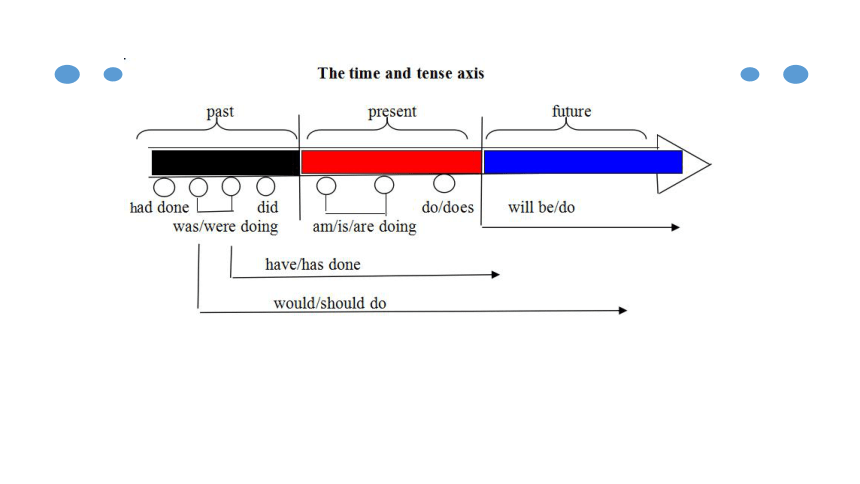
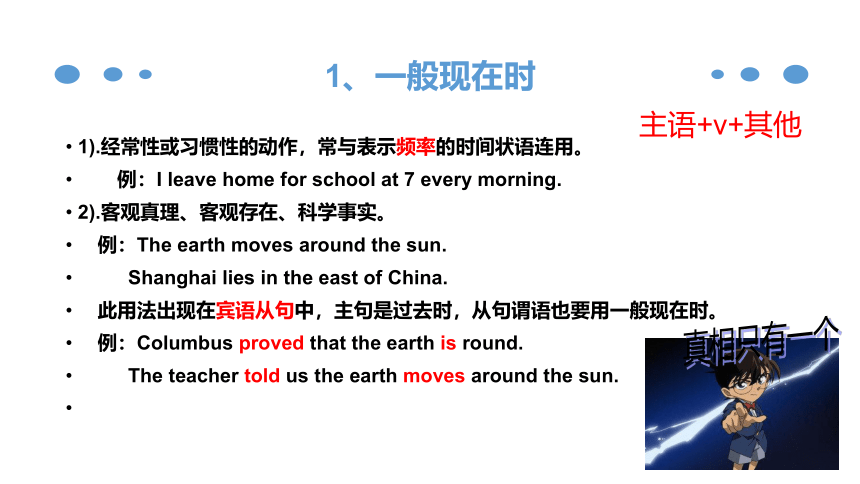
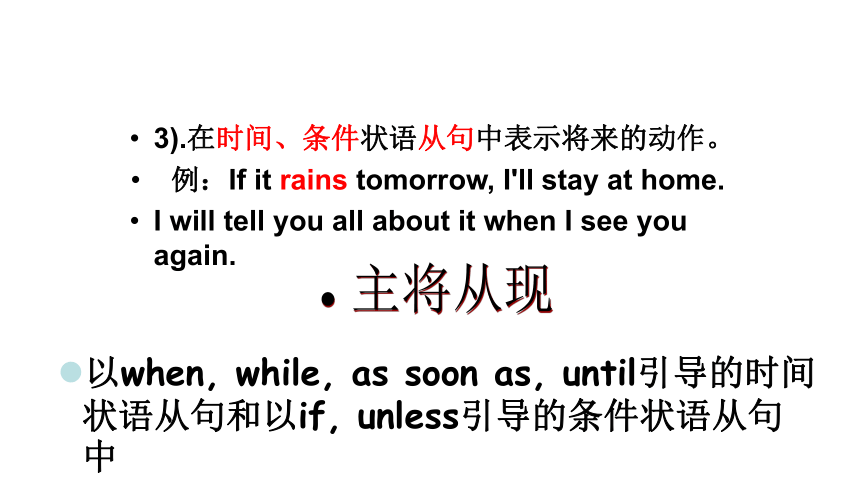
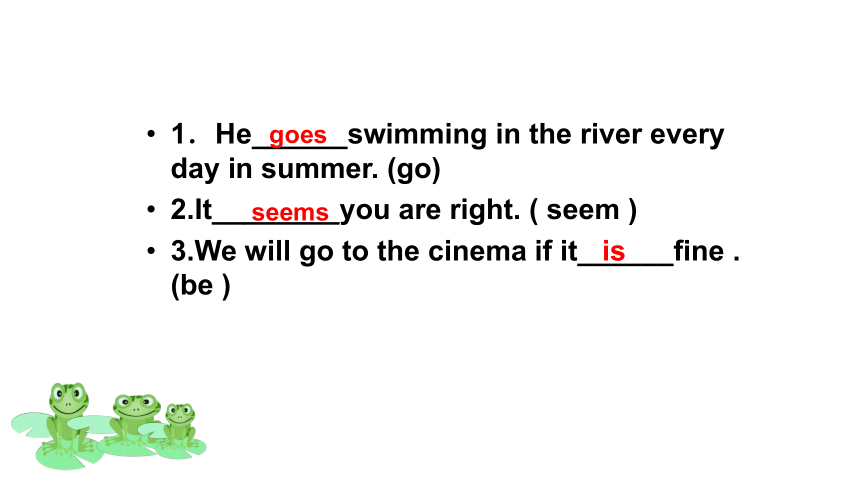
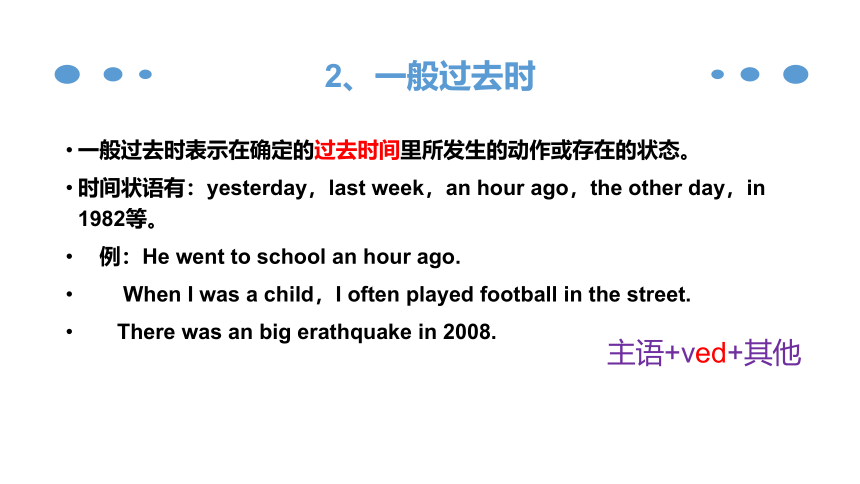
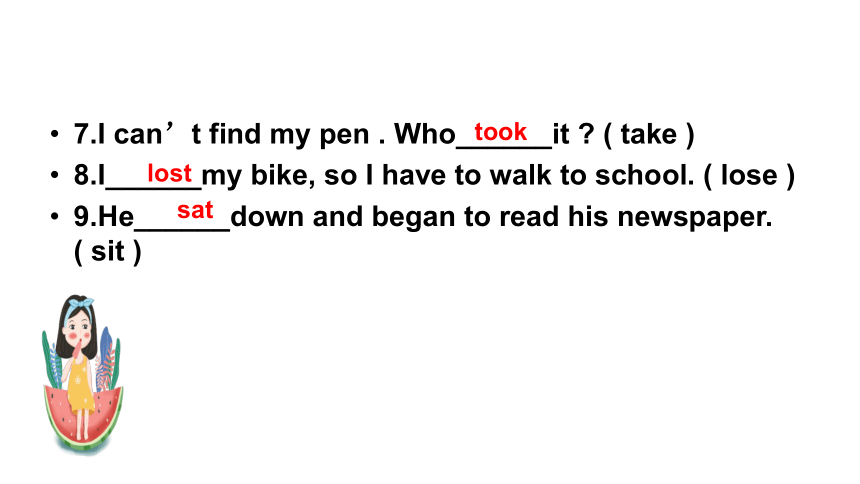
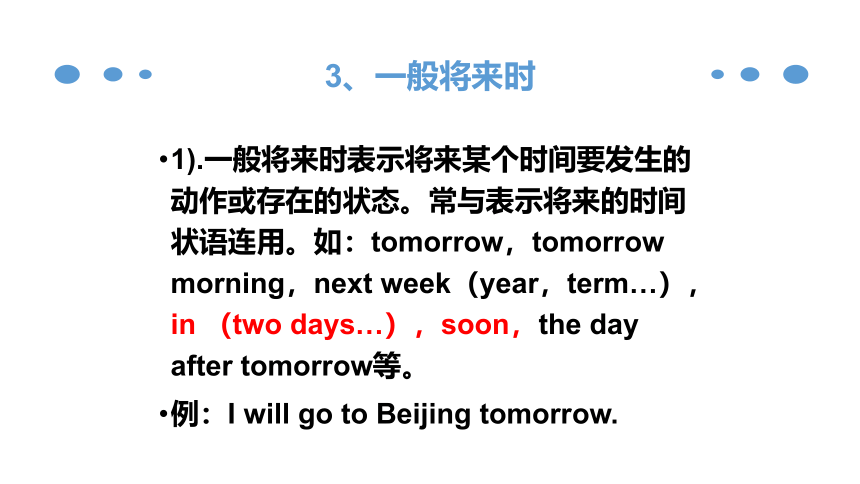
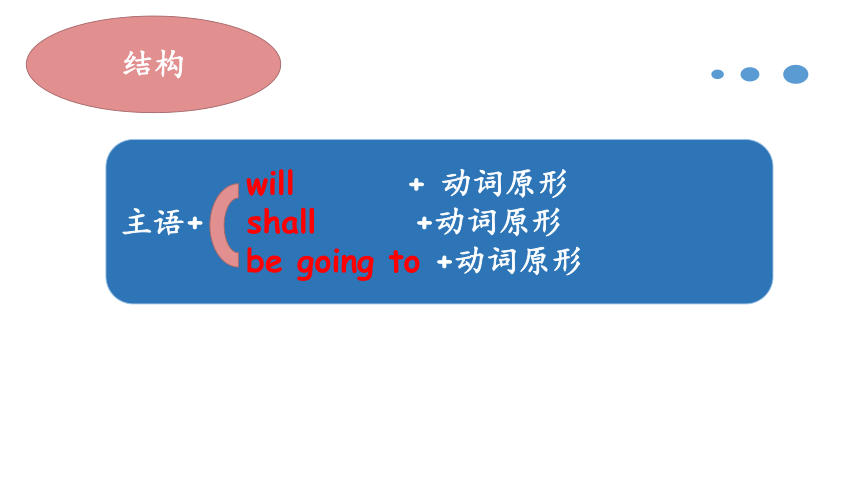
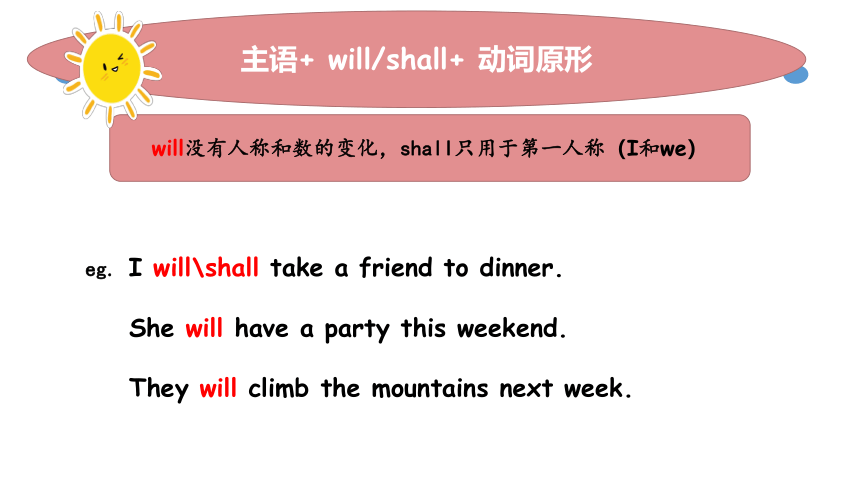
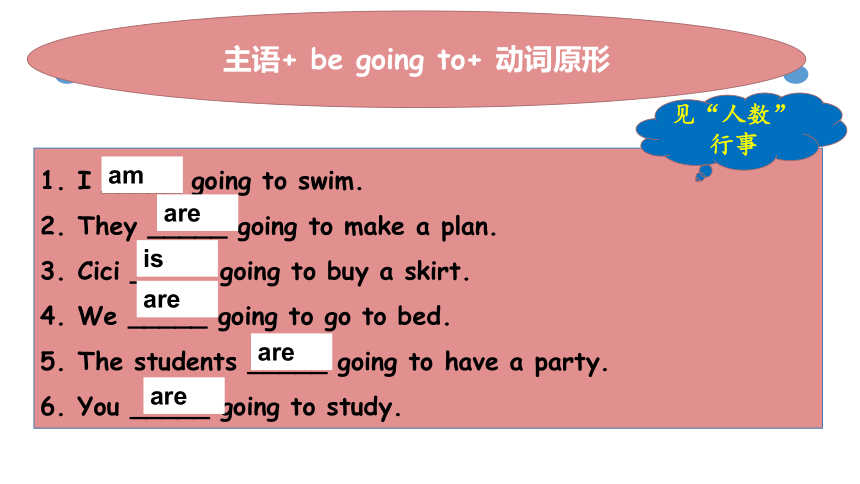
文档简介
(共34张PPT)
知识点复习
八大时态
时光机
Time Machine
1、一般现在时
1).经常性或习惯性的动作,常与表示频率的时间状语连用。
例:I leave home for school at 7 every morning.
2).客观真理、客观存在、科学事实。
例:The earth moves around the sun.
Shanghai lies in the east of China.
此用法出现在宾语从句中,主句是过去时,从句谓语也要用一般现在时。
例:Columbus proved that the earth is round.
The teacher told us the earth moves around the sun.
真相只有一个
主语+v+其他
3).在时间、条件状语从句中表示将来的动作。
例:If it rains tomorrow, I'll stay at home.
I will tell you all about it when I see you again.
主将从现
以when, while, as soon as, until引导的时间状语从句和以if, unless引导的条件状语从句中
1.He______swimming in the river every day in summer. (go)
2.It________you are right. ( seem )
3.We will go to the cinema if it______fine . (be )
goes
seems
is
2、一般过去时
一般过去时表示在确定的过去时间里所发生的动作或存在的状态。
时间状语有:yesterday,last week,an hour ago,the other day,in 1982等。
例:He went to school an hour ago.
When I was a child,I often played football in the street.
There was an big erathquake in 2008.
主语+ved+其他
7.I can’t find my pen . Who______it ( take )
8.I______my bike, so I have to walk to school. ( lose )
9.He______down and began to read his newspaper. ( sit )
took
lost
sat
3、一般将来时
1).一般将来时表示将来某个时间要发生的动作或存在的状态。常与表示将来的时间状语连用。如:tomorrow,tomorrow morning,next week(year,term…),in (two days…),soon,the day after tomorrow等。
例:I will go to Beijing tomorrow.
结构
will + 动词原形
主语+ shall +动词原形
be going to +动词原形
主语+ will/shall+ 动词原形
eg. I will\shall take a friend to dinner.
She will have a party this weekend.
They will climb the mountains next week.
will没有人称和数的变化,shall只用于第一人称(I和we)
1. I _____ going to swim.
2. They _____ going to make a plan.
3. Cici _____ going to buy a skirt.
4. We _____ going to go to bed.
5. The students _____ going to have a party.
6. You _____ going to study.
am
are
is
are
are
are
主语+ be going to+ 动词原形
见“人数”行事
1.I______with you if I have time . ( go )
2. —I need some paper .
—My assistant_________ some for you . ( bring )
will /shall go
will bring
am going to go
is going to bring
There be 的一般将来时
下周将会有一场篮球比赛。
There be a basketball match next week.
表示某地将存在某人或者某物
考点
There is going to be
There is/are going to be
There will be
There will be
“主将从现”
在以if,as soon as,unless等引导的时间或条件状语从句中,主句用一般将来时态,从句用一般现在时表将来
eg.I will go to the park if it doesn't rain tomorrow.
Unless you work hard, you won't pass the exam.
考点
Practice
As soon as the rain___, they will go out to pick apples.
A. stops B. stopped
C. will stop D. is stopping
--Can you go to the movies with me tonight
--If my mum ___,I will go with you.
A. allows B. allowed
C. allow D. was allowed
4、过去将来时
过去将来时表示从过去的某一时间来看将要发生的动作或存在的状态。它常用于宾语从句中。
例:He told me he would go to Beijing.
He said the train was leaving at six next morning.
She said she was going to start at once.
结构
will + 动词原形
主语+ shall +动词原形
be going to +动词原形
would
should
He said that he__________back in five minutes . ( come )
would come
was going to come
5、现在进行时
1).表示说话时正在进行的动作.常和Now,Look!Listen!或其他铺垫句连用。
例:I am reading a book now.
Look!They are having a basketball match.
It's 7:00 pm.The Greens are watching TV.
1.Look, the children_________ basketball on the playground. ( play )
are playing
主语+be+ving+其他
6、过去进行时
1).表示过去某个时刻或某一阶段正在进行的动作。
例:What were you doing at three o’clock yesterday afternoon?
2).用于when,while 引导的时间状语从句中。
用过去进行时表示较长的动作。
过去进行时可用于主句,也可用于从句。
例:I was doing my homework when someone knocked at the door.
While he was waiting at the bus stop,the traffic accident happened.(While 后的分句必须用进行时)
While I was reading,my sister was sleeping.(表示两个动作同时进行)
1.He__________ to the radio when I came in. ( listen )
2.What______you______ at five yesterday afternoon (do)
was listening
were
doing
基本结构:
+
主语+
be
v.ing
进行时
现在进行时:
+
主语+
am\is\are
v.ing
过去进行时:
+
主语+
was\were
v.ing
现在正在进行的动作
过去某个时间正在进行的动作
7、现在完成时
1).表示过去发生或已经完成的某一动作对现在造成的影响或结果。常用的时间状语:already,never,just,before,recently,for+时间段,since+时间点。
例:I have lost my key.
(说明过去某时丢的,现在还未找到。)
2).表示过去已经开始,持续到现在的动作或状态。
例:I have known him for ten years.
主语+have\has+been 其他
注意:因为含有for加一段时间或since加一个时间点这样的时间状语的完成时,有动态和延续性的特点,要用延续性动词,不能使用瞬间动词。
例:The old man has been dead for 2 years.
(过去分词做表语表示状态,可以延续)
The old man died 2 years ago.(终端动词)
用have/has been to, have/has gone to填空:
1.—Where is your brother
—He ____________ the shop. He’ll be back soon.
2. — ______ you ever _________ to America
—Yes, I ___________ New York twice.
has gone to
Have been to
have been to
have been to someplace. 曾经去过某地,已经回来.
has gone to someplace.某人去了某地,还没有回来.
1.He is very hungry. He_________ anything for three days. ( not eat )
2.We________good friends since we met at school . (be)
hasn't eaten
have been
8、过去完成时
表示过去某时开始,一直持续到另一时间和状态。即动作完成于某个过去时间之前。常用的时间状语:由by,before等词构成的表示时间的介词短语。“过去的过去”这种逻辑关系常通过上下文体现出来,而不一定受某个时间状语的限制。
例:We had not heard from him by the end of last year.
She said she had learned French for six years.
主语+had been+其他
Practice
Take the word work as an example,
1.He often _________ on the farm.
2.He _________ on the farm 2 years ago.
3.He _________ on the farm now.
4.He ____________ on the farm those years.
5.He _________ on the farm next year.
6.He said he _________ on the farm the next month.
7.He _________ on the farm for three years.
8.He said he __________ on the farm for 5 years.
works
worked
is working
was working
will work
would work
has worked
had worked
1.They_________since the factory opened.
A.had worked here B.have worked here
C.are working here D.worked here
2.---Have you read this book
----Yes. I ________it two weeks ago.
A.is reading B.have read
C.will read D.read
A
D
3.If he _________harder, he will catch up with us soon.
A.study B.studies C.will study D.studied
4.---May I speak to John
---Sorry, he _____Japan. But he _________in two days.
A.has been to, will come back
B.has gone to, will be back
C.has been in, would come back
D.has gone to, won't come back
B
B
5.Bad luck! We _______Mount Huang when it rained heavily.
A.climbed B.were climbing
C.are climbing D.have climbed
6.Keep quiet, please. They ________a meeting right now.
A.have B.had
C.are having D.have had
B
C
7.Lily said that she_____ on the new dress the next day.
A.put B.will put
C.would put D.have put
8.By the time I got there, the train ______ already _______.
A.have, left B.has left
C.was, leaving D.had, left.
C
D
知识点复习
八大时态
时光机
Time Machine
1、一般现在时
1).经常性或习惯性的动作,常与表示频率的时间状语连用。
例:I leave home for school at 7 every morning.
2).客观真理、客观存在、科学事实。
例:The earth moves around the sun.
Shanghai lies in the east of China.
此用法出现在宾语从句中,主句是过去时,从句谓语也要用一般现在时。
例:Columbus proved that the earth is round.
The teacher told us the earth moves around the sun.
真相只有一个
主语+v+其他
3).在时间、条件状语从句中表示将来的动作。
例:If it rains tomorrow, I'll stay at home.
I will tell you all about it when I see you again.
主将从现
以when, while, as soon as, until引导的时间状语从句和以if, unless引导的条件状语从句中
1.He______swimming in the river every day in summer. (go)
2.It________you are right. ( seem )
3.We will go to the cinema if it______fine . (be )
goes
seems
is
2、一般过去时
一般过去时表示在确定的过去时间里所发生的动作或存在的状态。
时间状语有:yesterday,last week,an hour ago,the other day,in 1982等。
例:He went to school an hour ago.
When I was a child,I often played football in the street.
There was an big erathquake in 2008.
主语+ved+其他
7.I can’t find my pen . Who______it ( take )
8.I______my bike, so I have to walk to school. ( lose )
9.He______down and began to read his newspaper. ( sit )
took
lost
sat
3、一般将来时
1).一般将来时表示将来某个时间要发生的动作或存在的状态。常与表示将来的时间状语连用。如:tomorrow,tomorrow morning,next week(year,term…),in (two days…),soon,the day after tomorrow等。
例:I will go to Beijing tomorrow.
结构
will + 动词原形
主语+ shall +动词原形
be going to +动词原形
主语+ will/shall+ 动词原形
eg. I will\shall take a friend to dinner.
She will have a party this weekend.
They will climb the mountains next week.
will没有人称和数的变化,shall只用于第一人称(I和we)
1. I _____ going to swim.
2. They _____ going to make a plan.
3. Cici _____ going to buy a skirt.
4. We _____ going to go to bed.
5. The students _____ going to have a party.
6. You _____ going to study.
am
are
is
are
are
are
主语+ be going to+ 动词原形
见“人数”行事
1.I______with you if I have time . ( go )
2. —I need some paper .
—My assistant_________ some for you . ( bring )
will /shall go
will bring
am going to go
is going to bring
There be 的一般将来时
下周将会有一场篮球比赛。
There be a basketball match next week.
表示某地将存在某人或者某物
考点
There is going to be
There is/are going to be
There will be
There will be
“主将从现”
在以if,as soon as,unless等引导的时间或条件状语从句中,主句用一般将来时态,从句用一般现在时表将来
eg.I will go to the park if it doesn't rain tomorrow.
Unless you work hard, you won't pass the exam.
考点
Practice
As soon as the rain___, they will go out to pick apples.
A. stops B. stopped
C. will stop D. is stopping
--Can you go to the movies with me tonight
--If my mum ___,I will go with you.
A. allows B. allowed
C. allow D. was allowed
4、过去将来时
过去将来时表示从过去的某一时间来看将要发生的动作或存在的状态。它常用于宾语从句中。
例:He told me he would go to Beijing.
He said the train was leaving at six next morning.
She said she was going to start at once.
结构
will + 动词原形
主语+ shall +动词原形
be going to +动词原形
would
should
He said that he__________back in five minutes . ( come )
would come
was going to come
5、现在进行时
1).表示说话时正在进行的动作.常和Now,Look!Listen!或其他铺垫句连用。
例:I am reading a book now.
Look!They are having a basketball match.
It's 7:00 pm.The Greens are watching TV.
1.Look, the children_________ basketball on the playground. ( play )
are playing
主语+be+ving+其他
6、过去进行时
1).表示过去某个时刻或某一阶段正在进行的动作。
例:What were you doing at three o’clock yesterday afternoon?
2).用于when,while 引导的时间状语从句中。
用过去进行时表示较长的动作。
过去进行时可用于主句,也可用于从句。
例:I was doing my homework when someone knocked at the door.
While he was waiting at the bus stop,the traffic accident happened.(While 后的分句必须用进行时)
While I was reading,my sister was sleeping.(表示两个动作同时进行)
1.He__________ to the radio when I came in. ( listen )
2.What______you______ at five yesterday afternoon (do)
was listening
were
doing
基本结构:
+
主语+
be
v.ing
进行时
现在进行时:
+
主语+
am\is\are
v.ing
过去进行时:
+
主语+
was\were
v.ing
现在正在进行的动作
过去某个时间正在进行的动作
7、现在完成时
1).表示过去发生或已经完成的某一动作对现在造成的影响或结果。常用的时间状语:already,never,just,before,recently,for+时间段,since+时间点。
例:I have lost my key.
(说明过去某时丢的,现在还未找到。)
2).表示过去已经开始,持续到现在的动作或状态。
例:I have known him for ten years.
主语+have\has+been 其他
注意:因为含有for加一段时间或since加一个时间点这样的时间状语的完成时,有动态和延续性的特点,要用延续性动词,不能使用瞬间动词。
例:The old man has been dead for 2 years.
(过去分词做表语表示状态,可以延续)
The old man died 2 years ago.(终端动词)
用have/has been to, have/has gone to填空:
1.—Where is your brother
—He ____________ the shop. He’ll be back soon.
2. — ______ you ever _________ to America
—Yes, I ___________ New York twice.
has gone to
Have been to
have been to
have been to someplace. 曾经去过某地,已经回来.
has gone to someplace.某人去了某地,还没有回来.
1.He is very hungry. He_________ anything for three days. ( not eat )
2.We________good friends since we met at school . (be)
hasn't eaten
have been
8、过去完成时
表示过去某时开始,一直持续到另一时间和状态。即动作完成于某个过去时间之前。常用的时间状语:由by,before等词构成的表示时间的介词短语。“过去的过去”这种逻辑关系常通过上下文体现出来,而不一定受某个时间状语的限制。
例:We had not heard from him by the end of last year.
She said she had learned French for six years.
主语+had been+其他
Practice
Take the word work as an example,
1.He often _________ on the farm.
2.He _________ on the farm 2 years ago.
3.He _________ on the farm now.
4.He ____________ on the farm those years.
5.He _________ on the farm next year.
6.He said he _________ on the farm the next month.
7.He _________ on the farm for three years.
8.He said he __________ on the farm for 5 years.
works
worked
is working
was working
will work
would work
has worked
had worked
1.They_________since the factory opened.
A.had worked here B.have worked here
C.are working here D.worked here
2.---Have you read this book
----Yes. I ________it two weeks ago.
A.is reading B.have read
C.will read D.read
A
D
3.If he _________harder, he will catch up with us soon.
A.study B.studies C.will study D.studied
4.---May I speak to John
---Sorry, he _____Japan. But he _________in two days.
A.has been to, will come back
B.has gone to, will be back
C.has been in, would come back
D.has gone to, won't come back
B
B
5.Bad luck! We _______Mount Huang when it rained heavily.
A.climbed B.were climbing
C.are climbing D.have climbed
6.Keep quiet, please. They ________a meeting right now.
A.have B.had
C.are having D.have had
B
C
7.Lily said that she_____ on the new dress the next day.
A.put B.will put
C.would put D.have put
8.By the time I got there, the train ______ already _______.
A.have, left B.has left
C.was, leaving D.had, left.
C
D
